Top Rankings
Banks SD 13 School District ranks among the top 20% of public school district in Oregon for:
Category
Attribute
Graduation Rate
Highest graduation rate (Top 20%)
For the 2025 school year, there is 1 public high school serving 387 students in Banks SD 13 School District.
Public High Schools in Banks SD 13 School District have a diversity score of 0.34, which is less than the Oregon public high school average of 0.59.
Public High School in Banks SD 13 School District have a Graduation Rate of 87%, which is more than the Oregon average of 82%.
The school with highest graduation rate is Banks High School, with 85-89% graduation rate. Read more about public school graduation rate statistics in Oregon or national school graduation rate statistics.
Minority enrollment is 20% of the student body (majority Hispanic), which is less than the Oregon public high school average of 41% (majority Hispanic).
Overview
This School District
This State (OR)
# Schools
3 Schools
371 Schools
# Students
1,091 Students
204,971 Students
# Teachers
58 Teachers
10,205 Teachers
Student : Teacher Ratio
19:1
19:1
District Rank
Banks SD 13 School District, which is ranked within the bottom 50% of all 186 school districts in Oregon (based off of combined math and reading proficiency testing data) for the 2021-2022 school year.
The school district's graduation rate of 85-89% has decreased from 90-94% over five school years.
Overall District Rank
#113 out of 189 school districts
(Bottom 50%)
(Bottom 50%)
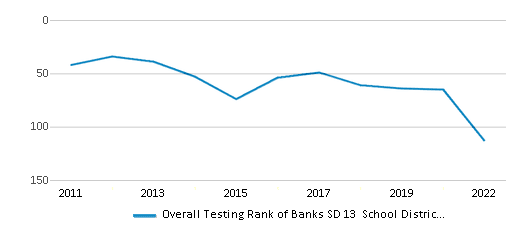
Math Test Scores (% Proficient)
30%
31%
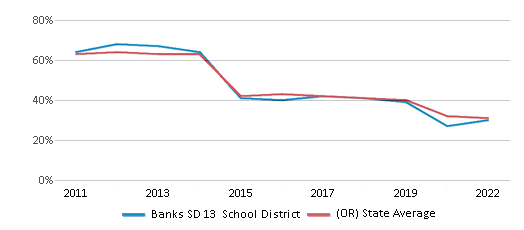
Reading/Language Arts Test Scores (% Proficient)
35%
44%
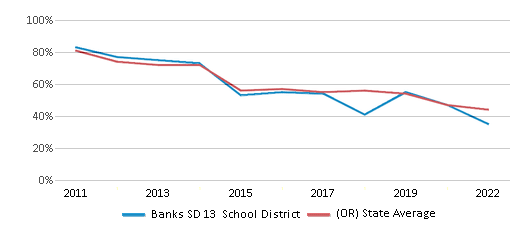
Science Test Scores (% Proficient)
30-34%
30%
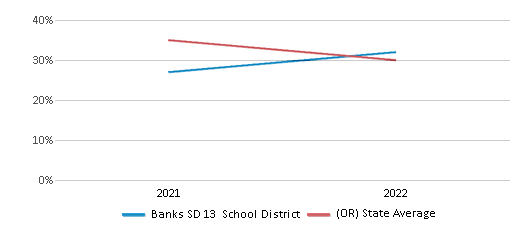
Graduation Rate
85-89%
81%
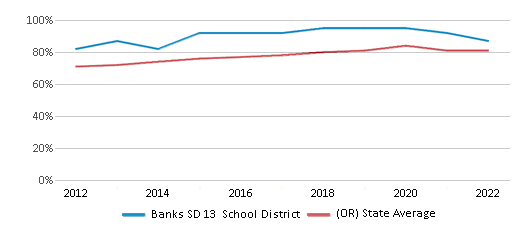
Students by Ethnicity:
Diversity Score
0.32
0.59
# American Indian Students
7 Students
2,693 Students
% American Indian Students
1%
2%
# Asian Students
11 Students
7,961 Students
% Asian Students
1%
4%
# Hispanic Students
117 Students
51,071 Students
% Hispanic Students
11%
25%
# Black Students
8 Students
4,496 Students
% Black Students
1%
2%
# White Students
895 Students
121,414 Students
% White Students
82%
59%
# Hawaiian Students
3 Students
1,535 Students
% Hawaiian Students
n/a
1%
# Two or more races Students
49 Students
13,886 Students
% of Two or more races Students
4%
7%
Students by Grade:
# Students in PK Grade:
-
-
# Students in K Grade:
73
1,709
# Students in 1st Grade:
73
2,008
# Students in 2nd Grade:
71
2,213
# Students in 3rd Grade:
78
2,225
# Students in 4th Grade:
77
2,266
# Students in 5th Grade:
78
2,328
# Students in 6th Grade:
78
3,227
# Students in 7th Grade:
88
4,443
# Students in 8th Grade:
88
4,797
# Students in 9th Grade:
102
44,713
# Students in 10th Grade:
102
46,380
# Students in 11th Grade:
101
44,723
# Students in 12th Grade:
82
43,939
# Ungraded Students:
-
-
District Revenue and Spending
The revenue/student of $13,575 in this school district is less than the state median of $18,279. The school district revenue/student has stayed relatively flat over four school years.
The school district's spending/student of $11,471 is less than the state median of $19,325. The school district spending/student has stayed relatively flat over four school years.
Total Revenue
$15 MM
$9,902 MM
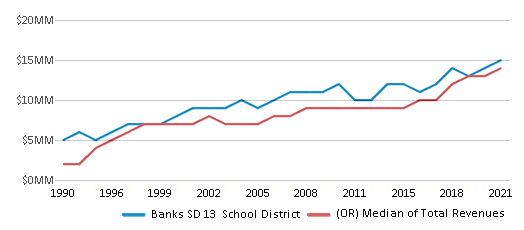
Spending
$13 MM
$10,468 MM
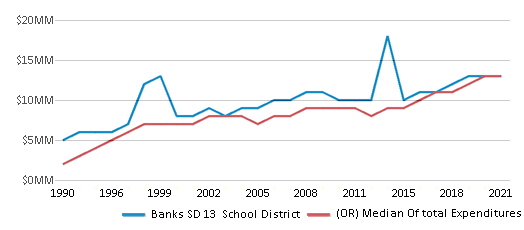
Revenue / Student
$13,575
$18,279
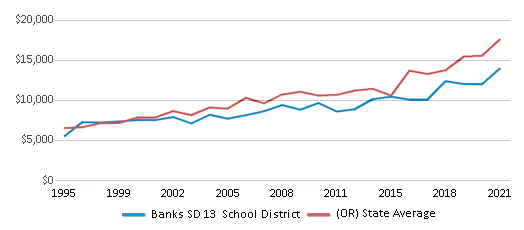
Spending / Student
$11,471
$19,325
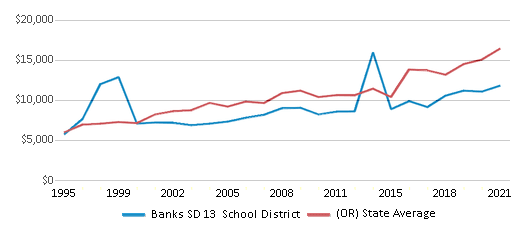
Best Banks SD 13 School District Public High Schools (2025)
School
(Math and Reading Proficiency)
(Math and Reading Proficiency)
Location
Grades
Students
Rank: #11.
Banks High School
(Math: 21-39% | Reading: 60-79% )
Rank:
Rank:
8/
Top 30%10
13050 Nw Main St
Banks, OR 97106
(503) 324-2281
Banks, OR 97106
(503) 324-2281
Grades: 9-12
| 387 students
Recent Articles

Year-Round Or Traditional Schedule?
Which is more appropriate for your child? A year-round attendance schedule or traditional schedule? We look at the pros and cons.

Why You Should Encourage Your Child to Join a Sports Team
Participating in team sports has a great many benefits for children, there is no doubt. In this article you will learn what those benefits are.

White Students are Now the Minority in U.S. Public Schools
Increasing birth rates among immigrant families from Asia and Central and South America, combined with lower birth rates among white families, means that for the first time in history, public school students in the United States are majority-minority. This shift in demographics poses difficulties for schools as they work to accommodate children of varying language abilities and socio-economic backgrounds.





